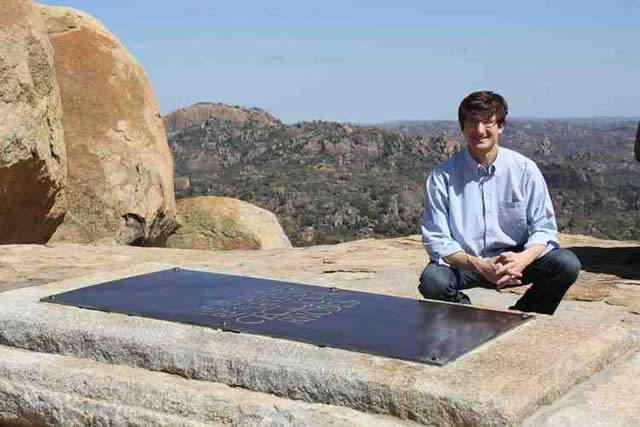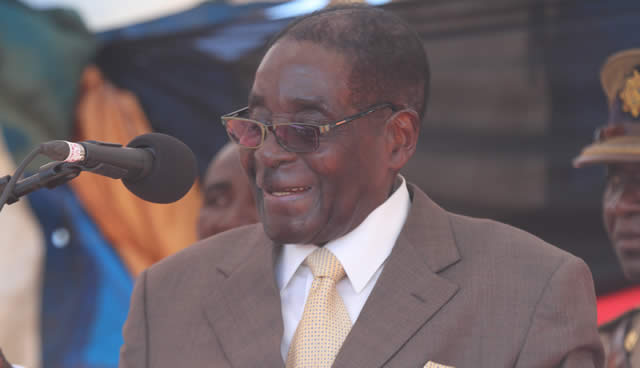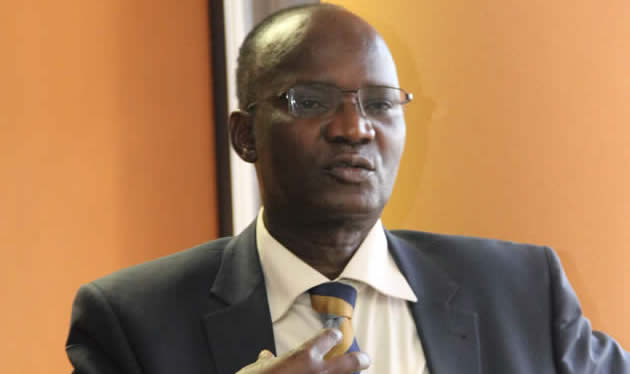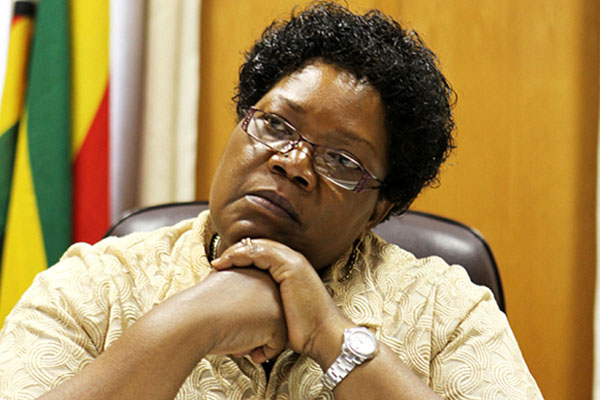Foreign trips: Expecting grace from Imperialism
 While Rhodes sleeps, sleeps well at the Matopos, he sits on one in Cape Town, the place he lived most and from where he dreamt colonising Africa, north of the Limpopo. Among his many beneficiary institutions was the University of Cape Town, which today empties a whole bucketful of faecal matter on the man so revered by the western world, the British especially. In the Arab world they pelt you with a shoe.
While Rhodes sleeps, sleeps well at the Matopos, he sits on one in Cape Town, the place he lived most and from where he dreamt colonising Africa, north of the Limpopo. Among his many beneficiary institutions was the University of Cape Town, which today empties a whole bucketful of faecal matter on the man so revered by the western world, the British especially. In the Arab world they pelt you with a shoe.
Here we drape you with our own dung, the ultimate statement of rejection, of expulsion. I am struck by the irony of it all.
Rhodes never lived here, only came here to pacify his rebellious army that had invaded our country, and of course to make peace with the leadership of a part of our national resistance. It was then that he saw the Matopos, and this after our elders had shown him the final resting place of our great forefather, Mzilikazi, whose remains are interred in one of the many caves of Matopos.
Enraptured by the sights of Matopos, but more importantly, wanting to bestride and reduce to vassalage the spirit of our nation, Rhodes made a “will” clad in iron, which provided that his body had to be encased by the barren boulders of Matopo, well above the remains of Mzilikazi, all to give this country a spiritual hierarchy founded on conquest.
He sleeps there, to this day, completely undisturbed, never lonely given the many who visit him from across the western world throughout the year to say hello and to pay tribute.
The day they yelled Bayethe!
The late Sir Robert Tredgold, once upon a time Chief Justice of this country under colonial rule, captured the drama on the day of Rhodes’ burial, with lots of Indunas in attendance. His brother, Frank, who led the proceedings described Rhodes as the chief induna, adding he was now committing his spirit to the natives of this country who would look after him, who would keep him forever.
To which the Indunas responded: “Bayethe!” In that short word, this country was thus committed to keeping uLodzi. To this day, we have done remarkably well in looking after the man who subjugated us, who plotted and executed our ruin.
President Mugabe, himself a fierce critic of imperialism in its colonial and neo-colonial forms, has a different way of carrying forward this assignment from Frank Rhodes.
He says the late empire-builder never paid taxes in his lifetime, never paid taxes to this country and its black owners. He does it now in his death, thanks to the tourism value of Matopos. I like the argument, but I don’t like the escape from the spiritual significance of what Rhodes’ continued stay atop the Matopos means to the national soul.
This country lives with the reality of a spiritual hierarchy, one naturalised, nay even sold to us as a tourist benefit to us.
They day I couldn’t dance
The last time I was at Matopos, I threatened a “borrowdale dance” on the backbone of Rhodes’ grave. The guards dissuaded me on pain of imprisonment. Meekly, I walked away, leaving our pantheon to sleep, revered, undisturbed. But what I found most disturbing were two things.
First, you go on a tour alone, with no guidance from our historians. You are left to narrativise what you see, to walk into the whole pilgrimage with your own meaning. Given our colonial history, given the preponderance of white visitors, you don’t have to be clever to guess what text gets embedded, entrenched.
Judged from reigning narratives, Rhodes remains a true king of his demesne!
Secondly, at the bottom of the hills, there is a clear injunction from the colonial Government that no other person should be buried on Matopos, unless they deserve well of their country. Interestingly, since the burial of Rhodes, Jameson, the Wilson group and others, no other person has been buried there. The beautiful ones are yet to be born!
And in case you think Manheru is stretching facts of history, it helps to know that soon after the Posselt brothers picked the remaining birds at the Great Zimbabwe, Rhodes immediately asked for them, to lodge them in Grote Schuur, his home. He was no fool.
Conquering the spiritual layer
Then you have the story of Pupu down in Lupane, across the mighty Shangane River. I visited the place last month. Pupu is where Lobengula wiped out the Allan Wilson group when it was about to abort his escape.
The whole lot rotted there, which is how the place got its name to denote stench-ful disgust: puu—puu. For this is how passers-by would acknowledge the existence of the decaying bodies of this contingent of invaders.
Today there is a bruised cenotaph built by historically conscious Rhodesians, all its narrative plaques removed or defaced. But what you still see are markings of a mass grave. Not of the dead whites whose remains were collected away with loud reverence. But of our “amajahas” who fell in that titanic battle which goes unrecorded, uncelebrated by our most advanced sense of history as a people.
The truth is the white men took away their dead. To where? Ahaa! To re-bury them at Great Zimbabwe, then reckoned as the spiritual centre of the country. They knew this country had a spiritual reality and that whoever needed to govern it had to own those spirits.
I hope you begin to see a method, a systematic conquest and supplanting of our shrines and spiritual fontanelles. Only much later were these bones exhumed yet again for Matopos.
Dear reader, nations are constructed, are imagined. They are never born tectonically. In case you still have more doubts, read Ken Flower’s Serving Secretly. Starting the third phase of our struggle obviously from a Rhodesian perspective, he makes an amazing admission: the moment we discovered that the “terrorists” had “abducted” spiritual mediums of the Korekore people, we knew we had lost the war.
This was a reference to the likes of Sekuru Chidyamauyu and others who had crossed the border to give a spiritual layer to the war of resistance. Indeed they lost the war.
Black man’s burden
But I had a good one from the South African Star newspaper. Dealing with the same matter, the paper crowned it all by a headline titled “The Black Man’s Burden”.
Just by way of background, the empire, unlike us, bore its own poets and eulogists, among whom was one Rudyard Kipling, an ex-colonial born in colonial India. His stay in India gave rise to a novel called “Kim”. Imbued by Victorian expansionist spirit, he authored a poem entitled “The White Man’s Burden”, which sang for British colonial conquest, suffusing it with a near-biblical mission and aura.
The Star’s leader was a play on Kipling’s well-known poem. The editorial started in a typical meander around the controversy around the effigy of a sitting Rhodes, eyes cast northwards to us who still remained to be conquered into the British empire.
It dwelt on the rich emotion triggered by the debate, admitting that the effigy indeed was an effrontery on African sensibility, and should have long been toppled. I would have added, toppled the same way we toppled him here to throw him away at some grounds around the National Archives Building where he lies prostrate, like Ozymandias!
We saw the Americans doing that in Baghdad, soon after Saddam fell, which means there is living materiality to these things we think innocuous. Much earlier, the Allied powers had done the same with Nazi cityscape so overpopulated with effigies that celebrated Nazi icons.
Colonial edifice complex
But expertly, the real meaning of the editorial comment was burdened on the last two paragraphs. In summary here was the paper’s argument. Inevitably Rhodes was a core part of Southern African history. And to say so was not to like him or dislike him. It was simply to state a fact of history. More fundamentally, toppling his effigy would not, by that act alone, end his baneful legacy on Southern Africa. But equally, black anger against these symbols of white colonial history, is real and cannot be ignored.
To get the right balance between purging black anger against colonial white symbols, and realising the inherent futility of thinking that such purgation resolves neo-colonialism, that, says the Star, is the black man’s burden! Colonialism created its own edifice complex. We need to invent our own narrative complex solidified in new edifices from our past, which, after all, is replete with historic moments.
Surrendering to enemies
I made passing reference to Saddam Hussein in the preceding paragraph. It got me to recall a statement issued by the Iranian Government soon after his fall. Paraphrased, Iranian Government gloatingly recorded that those who choose to make war against their own brothers, will end up surrendering to the enemy!
Iraq under Hussein and egged on by the same Americans, had fought a vicious war against Iran. I will never forget that line which is so true of our own wars on the continent, both before and after Independence. As I read pieces in yesterday’s media reporting that Mutasa and Gumbo were, on behalf of their group, courting MDC-T and other opposition groups, I just said to myself “how true!”
Of course those of us in the know testify that the courtship started well before the inclusive government, and proceeded under whispers right through the inclusive government. That, alongside the American factor, is what brought grief to the former Vice President. So this cannot be new. What is new, is the ring of desperation in the courtship.
I ascribe it to the impending by-elections whose proclamation was done yesterday, putting the wheel of fortune in great motion. And that is not new nor the first. We saw it with Tekere. We saw it with Makoni in 2013. Mutasa thinks he can stave off defeat by fighting under the banner of MDC-T.
He is desperate to survive a Biti-like destruction, now all but certain. It must be awfully difficult for him, the same way that it is so easy for Gumbo, himself having behaved similarly in 1980. So the news is not about the courtship. It is about who calls the shots in that courtship.
Clawing up a clammy hill
Having chickened out of two test by-elections in Zibagwe and Mt Darwin West, there is no way the Mujuru group can pretend a hold on the political landscape. They can only weaken or reinforce the clutch of those who do.
And that does not make them principal actors, only auxiliary ones. Their only plank has been to parade a bevy of lawyers who claim to be good. Even that legal initiative risks eclipse by a more riveting story on the family will. It remains to be seen when the case opens. But from the days of Bismarck, great political questions of the day are never resolved by affidavits, however loud these may be.
And that cannot be a point of awe to MDC-T, the supposed suitor, given how that party has reduced Biti, himself a lawyer of some renown, a politician of great naïveté, to smithereens. In fact, given the broader objectives of what the MDC-T hopes to achieve, their court actions are quite focused, give it to them.
They have little to learn or borrow from the Mutasa group. A bigger bind lies in the premise of the courtship: help us rescue Zanu-PF for ourselves! You have to really have dimwits in the MDC-T to want to help install Mutasa and his group. I mean how do you invite another party to clean up your party? And then what? Go home to sleep?
The only interest MDC-T has in the infighting in Zanu-PF is in so far as this might assist in softening Zanu-PF in the next poll contest. How Mutasa and company miss this bare fact, only the devil knows. So, from the very outset Mutasa goes out courting on a limp. Tsvangirai will tell him to apologise to MDC-T supporters for all he did during his Zanu-PF heyday, after which he will be shown the way to MDC-T Headlands cell, most likely led by the late Christpower’s father, to join the party and hopefully claw upwards that clammy political hill. And what all that does to the pretended liberation history, only God knows. In Zanu-PF, history matters, still matters, Sir.
Foreign policy as time series
Since winning chairmanship of Sadc and the AU, President Mugabe has been on the road. And for a statesman, being on the road means being “in air”. And this has generated copy, lots of it by volumes, little by way of meaning or value.
They started by counting the days he would be away from home, suggesting many decisions would have been foregone as a consequence. Then they proceeded to count the hours spent airborne, to suggest Zimbabwe had an absentee president. On auto-pilot, to use their favorite phrase. The idea initially was to suggest vacancy, in which case they would have to grapple with why that vacuum was not being filled, true to nature’s unfailing laws. It also undermined their presentation of the President as a strongman, a dictator. But much worse, it would deny them a universal scapegoat: if he is not in situ, he cannot be blamed for acts of commission or omission. Or would that suggest the opposition is effete? Today, and out of desperation, they are combining days away and hours on air, creating a novel way of interpreting foreign policy from time series. And in between this arithmetic are stories on supposed illness of the President or his wife, Amai Mugabe. To imagine that a whole newsroom builds its day, its daily newspaper, on issues around travel and supposed illness of this family, strikes me as a backhanded tribute to this mighty family. There isn’t much difference between these newsrooms and the Zanu-PF youth league, only that the latter is not being roundabout about its tributes.
—————-Settling for cheap potshots——–
As always this kind of overweening journalism is founded on a belief that it is being effective. That the First Family is being hit left, right, centre and sideways. Here are few facts which provide clue to how well-meaning Zimbabweans relate to the itinerary of their President. Zimbabwe has been privileged to lead two pan-African bodies: one subregional, another continental. That is a first on the continent, a real boon for a country against which the West, itself the financier of that crass media, has been trying tooth and claw to isolate. Here is one moment where Africa has decided to strike a blow for Zimbabwe, against imperialism, indeed one moment where Zimbabwe’s pan-African vision has been placed on the agenda, a vision personified by the President. To imagine that such a leadership role must be understood, appreciated, let alone supported by these western-sponsored pseudo-journals, is to expect too much grace and generosity from imperialism. The first thrust of imperialism was to keep Zimbabwe isolated. That has collapsed, thanks to Sadc and Africa. And as always, what you can’t beat, you seek to blot. So the idea is to put on the table a false argument which, it is hoped, will constrain Zimbabwe’s projection of continental leadership. The second take of imperialism was to pray to nature that time would effect its ravages, thereby making the President unable to discharge his official duties because of age-related infirmities. The ultimate would have been a motion in Parliament claiming incapacitation of a sitting president. At no time in history has a President ever come under such microscopic scrutiny from little brains, all pretending medical grounding from a bad school of journalism. He mixes dates, and his innumerate jury condemns maximally. He stumbles and his ailing jury pronounces him incapacitated. He stays out of the limelight for a couple of weeks, and his dead-men-come-to-life jury pronounces him dead. Jesus never urged believers to leave the dead to pronounce the dead, surely? And then the double trophy comes, and the President is aroused, showing greater energy than befits a 91-year old! He meets all fixtures of Sadc and AU combined. He pursues bilateral matters with equal commitment, in the process providing continental leadership while securing national benefits. And his critics are confounded, leaving them to settle for cheap potshots.
——————It’s about destination ——–
Well, here are a few facts sure to condemn them. No one is about to oblige their invitation to keep Zimbabwe in the limbo of isolation by pursuing a reticent foreign policy all in the name of cost saving. Sane Zimbabweans must leave westerners to seek to achieve that. Secondly, the President will fulfill the responsibilities of subregional and continental leadership, with cheers from media of goodwill, curses from his detractors. Thirdly, foreign policy levies costs in any polity. Zimbabwe is not about to be an exception. Ironically, the same media urges the same President to re-engage the West. How does he do so from Zimbabwe House, assuming that is the way to go? So it’s not about travel. It is about destination.
All routes must lead to Europe, to America! And all monies are in Europe, in America. A country like Algeria, with US$200bn in reserves, cannot be an investor! There is a deep-seated colonial reflex at work, and Rhodes is only too happy to be in us as a living tissue. Fourthly, the most effective way of safeguarding Zimbabwe’s interests at home and abroad is when her values become values of the neighborhood. That is an ABC of foreign policy, one unknown to our journalists who read the alphabet from the plaque of the West. When in history has such a small country as Zimbabwe turned her economic blueprint into a continental vision? You have to be quite bald not to see this massive breakthrough. The benefits of those trips are apparent to most Zimbabweans: leadership, pecuniary benefits, manpower development opportunities, joint venture proposals which are coming, aimed at value addition. Infrastructural projects, largely to do with energy, water, and communications. But to hope a malicious headline will detract from this, is to hope some little fly after some stout sojourn in a lavatory, can stop a bus bound for home.
Icho!








Comments